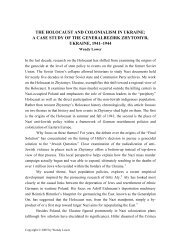Effects of Teachers' Mathematical Knowledge for Teaching on - Apple
Effects of Teachers' Mathematical Knowledge for Teaching on - Apple
Effects of Teachers' Mathematical Knowledge for Teaching on - Apple
Create successful ePaper yourself
Turn your PDF publications into a flip-book with our unique Google optimized e-Paper software.
Hill, Rowan, & Ball<br />
dem<strong>on</strong>strate subject-matter competency through subject-matter majors, certificati<strong>on</strong>,<br />
or other means. Programs such as Cali<str<strong>on</strong>g>for</str<strong>on</strong>g>nia’s Pr<str<strong>on</strong>g>of</str<strong>on</strong>g>essi<strong>on</strong>al Development<br />
Institutes and the Nati<strong>on</strong>al Science Foundati<strong>on</strong>’s Math-Science<br />
Partnerships are aimed at providing c<strong>on</strong>tent-focused pr<str<strong>on</strong>g>of</str<strong>on</strong>g>essi<strong>on</strong>al development<br />
intended to improve teachers’ c<strong>on</strong>tent knowledge. This focus <strong>on</strong> subjectmatter<br />
knowledge has arisen, at least in part, because <str<strong>on</strong>g>of</str<strong>on</strong>g> evidence suggesting<br />
that U.S. teachers lack essential knowledge <str<strong>on</strong>g>for</str<strong>on</strong>g> teaching mathematics (e.g.,<br />
Ball, 1990; Ma, 1999) and because <str<strong>on</strong>g>of</str<strong>on</strong>g> evidence from the educati<strong>on</strong>al producti<strong>on</strong><br />
functi<strong>on</strong> literature suggesting that teachers’ intellectual resources significantly<br />
affect student learning.<br />
Despite this widespread interest and c<strong>on</strong>cern, what counts as “subjectmatter<br />
knowledge <str<strong>on</strong>g>for</str<strong>on</strong>g> teaching” and how it relates to student achievement has<br />
remained inadequately specified in past research. A closer look at the educati<strong>on</strong>al<br />
producti<strong>on</strong> functi<strong>on</strong> literature, <str<strong>on</strong>g>for</str<strong>on</strong>g> example, reveals that researchers<br />
working in this traditi<strong>on</strong> have typically measured teachers’ knowledge using<br />
proxy variables, such as courses taken, degrees attained, or results <str<strong>on</strong>g>of</str<strong>on</strong>g> basic<br />
skills tests. This stands in sharp c<strong>on</strong>trast to another group <str<strong>on</strong>g>of</str<strong>on</strong>g> educati<strong>on</strong> scholars<br />
who have begun to c<strong>on</strong>ceptualize teachers’ knowledge <str<strong>on</strong>g>for</str<strong>on</strong>g> teaching differently,<br />
arguing that teacher effects <strong>on</strong> student achievement are driven by<br />
teachers’ ability to understand and use subject-matter knowledge to carry out<br />
the tasks <str<strong>on</strong>g>of</str<strong>on</strong>g> teaching (Ball, 1990; Shulman, 1986; Wils<strong>on</strong>, Shulman, & Richert,<br />
1987). According to this view, mathematical knowledge <str<strong>on</strong>g>for</str<strong>on</strong>g> teaching goes bey<strong>on</strong>d<br />
that captured in measures <str<strong>on</strong>g>of</str<strong>on</strong>g> mathematics courses taken or basic mathematical<br />
skills. For example, teachers <str<strong>on</strong>g>of</str<strong>on</strong>g> mathematics not <strong>on</strong>ly need to<br />
calculate correctly but also need to know how to use pictures or diagrams to<br />
represent mathematics c<strong>on</strong>cepts and procedures to students, provide students<br />
with explanati<strong>on</strong>s <str<strong>on</strong>g>for</str<strong>on</strong>g> comm<strong>on</strong> rules and mathematical procedures, and analyze<br />
students’ soluti<strong>on</strong>s and explanati<strong>on</strong>s. Because teachers’ knowledge has<br />
not been adequately measured, the existing educati<strong>on</strong>al producti<strong>on</strong> functi<strong>on</strong><br />
research could be limited in terms <str<strong>on</strong>g>of</str<strong>on</strong>g> its c<strong>on</strong>clusi<strong>on</strong>s, not <strong>on</strong>ly regarding the<br />
magnitude <str<strong>on</strong>g>of</str<strong>on</strong>g> the effect <str<strong>on</strong>g>of</str<strong>on</strong>g> teachers’ knowledge <strong>on</strong> student learning but also<br />
regarding the kinds <str<strong>on</strong>g>of</str<strong>on</strong>g> teacher knowledge that matter most in producing student<br />
learning.<br />
As we discuss below, <strong>on</strong>ly a few educati<strong>on</strong>al producti<strong>on</strong> functi<strong>on</strong> studies<br />
have assessed teachers’ mathematical knowledge directly and used this<br />
measure as a predictor <str<strong>on</strong>g>of</str<strong>on</strong>g> student achievement (Harbis<strong>on</strong> & Hanushek, 1992;<br />
Mullens, Murnane, & Willett, 1996; Rowan, Chiang, & Miller, 1997). In most<br />
other studies, tests <str<strong>on</strong>g>of</str<strong>on</strong>g> teachers’ verbal ability have been used to predict<br />
achievement outcomes in reading and mathematics. As a result, despite c<strong>on</strong>venti<strong>on</strong>al<br />
wisdom that elementary U.S. teachers’ subject-matter knowledge<br />
influences student achievement, no large-scale studies have dem<strong>on</strong>strated<br />
this empirically (Wayne & Youngs, 2003). Nor is the situati<strong>on</strong> ameliorated by<br />
examining process-product research <strong>on</strong> teaching, in which both measurement<br />
<str<strong>on</strong>g>of</str<strong>on</strong>g> subject-specific teaching behaviors and direct measurement <str<strong>on</strong>g>of</str<strong>on</strong>g> teachers’<br />
subject-matter knowledge have been notably absent.<br />
372




